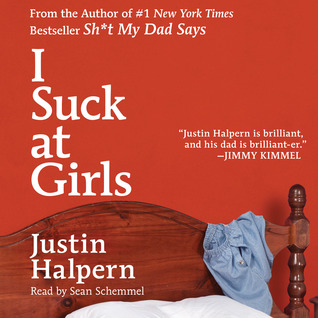 I Suck at Girls by Brendan Halpern
I Suck at Girls by Brendan Halpern
I really liked SHIT My Dad Says (no asterisk because I’m a goddamn adult. Capitalized because I’m an adult only chronologically), but this one wasn’t quite as good. Still fun, but the shit the dad says is shittier than the shit the son says, so I missed the awesomeness of the fatherly shittiness. Also, the first book really rose above being just a chronicle of some funny shit, and in fact was a little bit poignant in spots. This shit was mostly about sucking at girls, which we all do, but didn’t really hit the same highs or surprise me the way the first one did.
If you liked Shit, you’ll like Suck, but Suck is shittier than Shit.
~
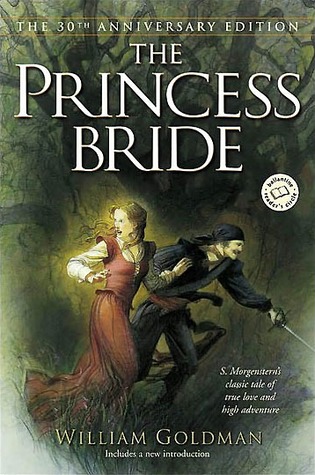 The Princess Bride by William Goldman
The Princess Bride by William Goldman
Yes, I finally experienced the Princess Bride, both in book and in film.
The movie is one of those that you have to see if for no other reason than to stop people’s incredulity when you explain that you haven’t. There are plenty of other reasons to watch it, but good god, there aren’t many statements that bring forth as much shock and awe as “Princess Bride? Never seen it.”
Some statements that bring forth equivalent surprise:
“I’ve never been in a ball pit.”
“I’ve never see precipitation of any kind.”
“I’ve never seen the Goonies/the Breakfast Club/the Karate Kid.” (these I know from experience to be on about the same level)
I’m guilty of doing the same thing, though. When a friend recently told me she’d never seen Back to the Future, ANY of them, I said, “Really? None of them?”
It’s a nice way to communicate with someone, restating everything in question form.
“That’ll be $4.95.”
“Really? $4.95? In money? American money?”
The book is really good, though. It has a surprising element that’s mostly absent in the movie, which is the author writing short asides explaining how he edited the original text and why. Great stuff, really funny. I can see why it’s so popular amongst adults. It’s got that vibe to it, maybe the closest equivalent being a Pixar movie, where you feel like it’s for kids, but also that we’re being tricked into thinking it’s for kids when really it’s more for adults in a lot of ways. As if they’re somehow made to make us feel nostalgia for the movies of childhood, but to feel the nostalgia when seeing something brand new and for the first time, as adults. It’s very tricky.
One more thing: if a friend tells you that a book is a favorite, or a movie, or a song, it’s probably worth your time to see what the fuss is about. Seriously. That’s how I ended up reading a long form fairy tale in between a book about cage fighters and a book about a bomb tech.
The beauty of reading a friend favorite is that even if you’re not all that into the book, you’ll still understand something new about your friend. So if it drags in sections or if it takes a little longer to convince you of its value, you’ve got more reason to read it.
Everybody has plenty of stuff on the to-read list. But if you’ve got a little time, try reading something that a friend or a loved one would claim as a favorite. It’s time well spent.
~
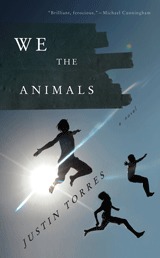 We the Animals by Justin Torres
We the Animals by Justin Torres
Good. So good. Right up to the end.
The book has this great tone to it, and it captures boyhood in a way that reminded me of being a kid more than just about any other thing I can remember. There’s a very strange thing that happens between brothers. You sort of love each other, but also sort of hate each other. And at times, you really can act like, as the book suggests, animals. As one of the early chapters says, there’s never enough. Food or affection or daylight or anything. There isn’t enough of anything, ever.
What the book really got at, in a way you don’t see a lot, is what I’ve always thought of as the true nature of sibling relationships.
I think the cliche thing people say about family is something along the lines of “I beat the hell out of my brother. But if anyone else messed with him, I’d knock his block off.” Or “his lights out.” Or “him into next week.” Honestly, though, that feels like revisionist history to me and a lazy attempt to capture how strange it is to be with these kids who you are told to love yet represent your main competition in a lot of ways. Each brother is his own country competing for resources. Each brother is his own army, alternately making alliances and being the victim of them. Each brother is his own boy, but he’s also tied inexorably to these other boys without choice in the matter.
The writing is crisp, short, and does a great job of straddling the line between being a child narrator and an adult reminiscing, which makes it all feel so, so real.
The objection I have to the book is about the last 20 pages, when the narrator does a flash-forward of maybe ten years, is forced out of the closet after his family finds his journal, and describes his being put in some sort of psychiatric treatment. It’s not that this was any sort of problem for me. And there’s actually a poignant feeling of the bond between the three brothers dissolving, and this chain of events is definitely what makes this possible. But the rest of the book felt so slow, so small, so moment to moment that to leap forward and change the characters so much after we’ve been watching them grow up in pieces was less satisfying.
I don’t want to say the ending ruined the book or anything like that. I really don’t think that’s possible. And honestly, it probably had less to do with the ending and more to do with the fact THAT it ended. It’s a gorgeously written book, and just when I thought each of the short sections might be falling flat the wind would change direction and blow the dust off a beautiful, sometimes savage revelation. It worked for me in a big way.
I wonder if perhaps it was that I wasn’t ready to leave that world just yet. Growing up, you’re always ready to leave whatever age you are. When you’re 15, you’d take a pill that made you 16 in a heartbeat. It’s only later when you think how sometimes you’d like to be back there, how it felt safe. How punches and being “It” were a lot less scary than the stuff that happens when you’re older.
So I wonder. I wonder if there are times when I want to go back there. And I wonder if maybe, reading this book, I wanted to walk away thinking the characters would never have to leave that place.
~
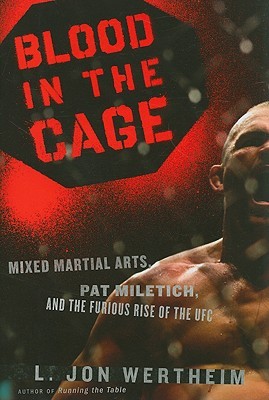 Blood in the Cage: Mixed Martial Arts, Pat Miletich, and the Furious Rise of the UFC by L. Jon Wertheim
Blood in the Cage: Mixed Martial Arts, Pat Miletich, and the Furious Rise of the UFC by L. Jon Wertheim
Why would anyone want to read a book about mixed martial arts? Especially someone who doesn’t really have all that much interest in the sport?
Well, what’s funny about this book is that the title and cover really convey how I feel about the sport in general. The book itself, as an object, is really kind of a representation of everything good and bad about the sport.
The good parts of the book are mostly the sections that serve as a biography of Pat Miletich, a smalltown bar fighter who finds his way in the world through mixed martial arts. The guy starts out fighting anyone and anything that gives him a hard time, including at one point fighting a jeep. Yes, as in the vehicle.
In a weird way, delving into the world of cage fighting was the beginning of Miletich’s calming down just a bit. His life became more regimented, and he started to build relationships with other people, eventually becoming an excellent and generous trainer as well as a respected fighter.
Which sort of brings us to the bad part of MMA and the book itself.
As Miletich became a better fighter, his skills got to be more technical, but his fights were not as exciting to watch unless you were so into the world of MMA that you could understand exactly what he was doing. Which meant he never really got his due, in my opinion, and the world of MMA passed him by.
So here’s the thing, what I learned from this book. After reading the book and learning a bit more about the history of the sport, I feel like the world of MMA has room for people who are willing to play good versus evil roles in the style of pro wrestlers. It has room for people to have ridiculous ads slapped all over their trunks. It has room for energy drinks and some of the most egregious affronts to the world of fashion that t-shirts have ever made. What it doesn’t seem to have room for is someone like Pat Miletich, which to me kind of explains everything that’s wrong with it.
The promoters of fights, the ones making the money, don’t care about the sport one bit. They just care that people pay to watch it. As long as people will pay, they’re happy.
The sport has definite potential, and underneath the shell of bullshit and outright douchebaggery, there’s a legitimacy and a stable of super, ultra-elite athletes who are doing a hell of a lot of work for a hell of a small paycheck, in most cases.
So the book, as a read, was pretty good. You learn a lot of interesting stuff, and if you ever question the legitimacy of MMA as a sport, it gives you something to think about. Especially as it’s sort of considered the bad boy cousin of boxing, when in actuality boxing is far more damaging long term as fighters are taking repeated shots to the head as opposed to damage to the body or even tapping out before real damage is done.
Here’s what I hate about the book, which is also what I hate about the sport. Why do we have to have this decent book wrapped in a cover and title that is so silly? It’s not really what the book is about, as evidenced by the long subtitle. I honestly found the book to be fairly critical of the UFC overall, which I don’t think was suggested by the title. Just the way we have this sport that’s wrapped in a bunch of nonsense, silly sponsors, horrible music, entering an arena through machine-provided smoke, we have a book that is also wrapped in nonsense and makes a person like me embarrassed to even be associated with it.
I understand that people want to make money. And if MMA went the way that makes sense to me, it would be about as popular as Olympic wrestling. Same deal with the book. They had to sell it to SOMEONE.
But for my money, I feel like there are plenty of activities and products that appeal to assholes, and it sure would be nice if there was something out there for the rest of us.
The real tragedy of the sport and this book is that the only way for them to sell is to submit to a terribly flawed market system that ends up polluting the end product. It’s such a waste.
~
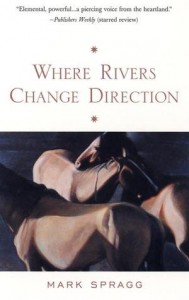 Where Rivers Change Direction by Mark Spragg
Where Rivers Change Direction by Mark Spragg
I read a rumor somewhere that Mark Spragg was unhappy with one of his novels. I don’t know whether that was the one that followed this, An Unfinished Life, but I have my suspicions.
I wish I could remember where I saw that little bit of information, but it’s gone now. It could, in fact, be a complete lie and more just a highlight of how I felt.
After taking a run at An Unfinished Life, I set Mark Spragg down. It’s compared to Plainsong and some of Cormac McCarthy’s stuff, but it just didn’t do a whole lot for me. With this book, though, the comparison works for me a little better.
What I’m trying to say is, if you gave Mark Spragg a shot before and didn’t get into him, I’d say give this one a go. It worked for me. The writing was tighter, and the stories were incredible, whether it’s the story of the toughest kid in town or how young love is sometimes expressed by an iceball to the face or, in the first and one of the best pieces, about riding a sick horse nearly to death and fearing that “careless boys grow into careless men.”
~
 The Fighter’s Mind: Inside the Mental Game by Sam Sheridan
The Fighter’s Mind: Inside the Mental Game by Sam Sheridan
What’s weird about this book is that I can’t really imagine anyone reading it without being much interested in fighting. What’s REALLY weird about THAT is that I don’t have much interest in fighting. Not on this level, anyway, with descriptions of people I’ve never heard of doing things that are difficult to imagine. Just trying to understand what’s going on, my recent Google search history must look like that of a guy prepping to street fight his way across South America. The long way.
What I WILL say is that there are some really interesting insights in this book that apply to a hell of a lot more than fighting. To everything, really. Which serves to make the point made in just about every book, something about how fighting is a universal language and takes us back to our roots and so on and so on. But honestly, there’s some stuff of value in here to the complete non-fighter.
Because I don’t want to ruin the whole book by summarizing it, I’ll just talk about what I found to be one of the more interesting ideas in the book, and based on that you can decide if it’s worth your time to look through the rest.
One thing a lot of the interviewed fighters agreed on was the idea of attacking someone where they are strongest. Let’s take this out of the realm of fistfighting for a minute.
Let’s say you’re a warlord. And I’m a warlord. I built a huge fortress that I claim is impenetrable. Nobody has broken down the doors in a hundred years. Nobody’s even gotten close.
Now, you’re going to attack me, and you’re faced with a choice. Most would say, Okay, the gate is impenetrable. Let’s go in the side door. But what a lot of fighters would tell you, and chess players and ping-pong players and all kinds of weirdos profiled in this book, is that you should come right through the front door. Crazy, I know. But the thing is, if you enter the fortress by digging a tunnel underneath, you still have to beat me once you’re inside. It’s going to be tough. I still think the front door is impenetrable, and though you’ve worked around it I still have that mental security blanket. If you manage to come in the front door, however, everything I thought I knew about how the battle would go is destroyed. I was expecting you to go around, or to subvert my defense. But instead you came right through, ran right over the top of my best weapon, and now I have no confidence in anything.
In the world of mixed martial arts, you can kind of think of there being the worlds of stand-up fighting and ground fighting. If we were fighting, you an expert wrestler and me coming from a boxing background, you would assume that I was going to try and beat you with punches and to stay off the ground however I could. So your game plan would be to get me on the ground, even if it meant eating a few punches. But if I know that’s your strength, imagine if I decide that I’m going to take things to the ground right off, and for the first few minutes I manage to hold my own. The round ends, and then we both go back to our corners, but you go back knowing that I’m not afraid of the best weapon you have.
It’s a lesson that applies to a lot of things, I think. I don’t think of myself as a person who is often frustrated, but in looking at it I think that a lot of the times I DO feel frustrated it’s as a result of being stymied by something that lies within my strengths. If I make one out of every 15 shots in pool, it doesn’t faze me because I don’t expect to make ANY. But if I try to spell the word “rhinoceros” ten times in a row, and every single time I see that red squiggly line appear beneath it, I’m going to start thinking something’s wrong. I’ll be wondering if I’m not the speller I once was. I’ll be thinking about “rhinoceros” the next time I go to spell “diplodocus” and feel completely sure that I’m going to fail.
It’s a really great tool to be aware of, that in life you’re going to fail at things you’re good at, and it would behoove a person to be very aware of that and not be overly sensitive.
There are probably half a dozen lessons like that in the book. So if it’s of interest to you, and if fighting is at least not a hindrance to your reading it, then I say go for it.
If the fighting is still completely nonsensical and barbaric, you might try the author’s other book, A Fighter’s Heart, which is more about explaining that inexplicable: the Why.
Oh, and also, Marcelo Garcia is a guy mentioned in the book. Here’s a brief video that goes a long way to explaining what’s so difficult to capture in words, especially at about 4 min 50 when he’s rolling around with a guy who is WAY bigger (even non-fight-fans can probably appreciate this, and it’s more akin to wrestling than fighting. No blood 🙂 ). It’s like watching someone wrestle a pile of snakes.
http://www.youtube.com/watch?v=AY8JlJ…
~
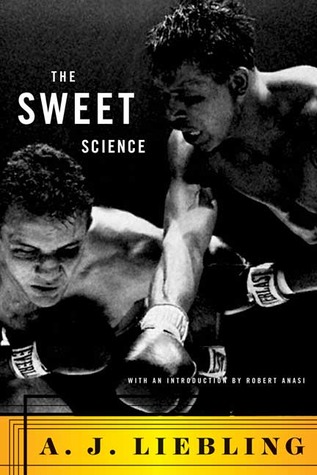 The Sweet Science by AJ Liebling
The Sweet Science by AJ Liebling
You can’t go too far into books about fighting without running into this one over and over.
Like a lot of older books, you can feel the vintage on this one. For me, it’s about three things: Descriptions of people, descriptions of places, and a careful cataloging of what everybody is eating.
The first serves the book well. Getting a description of the different boxers is helpful, especially because it seems like most descriptions of the time are strongly influenced by whether or not the writer is a fan of an individual.
The second is alright, but every bout the guy attended was prefaced by a description of the crowd and the venue. There was some pretty good material about people seat-hopping and the way they would try to pretend like they had no idea what they’d done, but ultimately it got to be just another part of another chapter.
The third, I could care less. Eat an egg hard boiled or soft. Just eat the damn egg already.
Probably the most interesting part of this book, to me, was that Liebling made a pretty good case for television ruining boxing. It would go against logic in a lot of ways. You’d think the increased chance for exposure would be huge. But in fact, television killed amateurism, which killed the sport.
The problem, as he put it, was that time was a young fighter would fight in small clubs, clubs spectators would pay to enter. This meant that a young fighter could get quite a bit of experience before stepping into the ring for a full-length match against a dangerous opponent. Television, however, only featured big fights, which meant that a lot of fighters had to either be pushed into the big time way before they were ready or figure out how to make their money elsewhere.
He probably put it best, saying that television’s not concerned with the sport, only the sale of beer and razor blades.
I don’t think much has changed, sadly. Most fighting sports are amped up artificially with layers of invented grudges and so on that are supposed to heighten the drama, but to me they just cheapen the whole thing and are meant to sell energy drinks.
Hell, at least when they were selling razors and beers they were selling products I could get behind.
I guess the book also makes a case against television in that it is very descriptive of a world that existed around a sporting event. Through the long descriptions of New York City, the ways Liebling got to the fights and the bars he visited afterward, you got the sense of these fights being big events, a full night out for a lot of people. There’s a positive to being able to see every major league game in your living room, but there’s also a price, and that price is the loss of a sense of community around sports. At least for me. I could watch 100 games on tv, but I’m way more likely to remember actually going to ONE because of the people I’m there with and what we might have talked about.
This might be why people are always wanting to talk about sports. Maybe if everyone was actually going to stuff, they could talk to the people there and leave me the hell alone about it.
Anyway, I would skip this one unless you’re just a huge fan of 1950’s boxing. It’s a bit of a slog, and to me there’s a lot about it that’s very dated. It’s about a golden era, and it’s got some cleverness to it, but it’s just not that great a read, start to finish
~
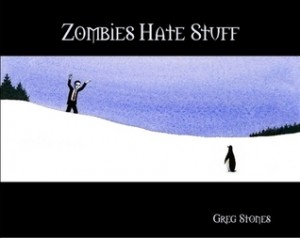 Zombies Hate Stuff by Greg Stones
Zombies Hate Stuff by Greg Stones
I’m confused. Not so much by the book but more as to why people online are reviewing this book so often.
Not to mention that I came across a review that was hidden because it contains spoilers.
People, let’s calm down with the use of “spoiler alerts” on everything. There’s a difference between a spoiler and saying something that happens in the book.
If you’ll indulge me for a second, this book lets you know that zombies hate roving bands of ninja. Okay, so that’s a thing that happens in the book. But we already knew that zombies hate stuff based on the title. A roving band of ninja could be considered stuff, therefore I think it’s pretty reasonable to expect something along those lines might show up.
Further, I don’t really know how much one can spoil a book that takes less then 1 minute to finish and, for the most part, does not have an important order to it.
We need some sort of “spoiler alert” Geneva Convention here. When it’s necessary, when it’s cute, and when it’s just not appropriate.
Necessary:
I’d say it’s necessary whenever you’re going to explain something that will cause 10% or more of something to become pointless. So if a movie is 250 minutes long, don’t tell me anything that will ruin the first 25 minutes. Also, as an added caveat, if something spoils greater than 10% of the QUALITY of something, it may warrant a spoiler alert. If you only ruin 10 minutes of a movie for me, but it’s by far the BEST 10 minutes, then we have a problem.
Cute:
I’d say that you’ll have to go with your gut on this one, but basically, the more obvious something is, the cuter it is to warn with “spoiler alert” ahead of time. Or, the more unnecessary. For example, “I went to work. Spoiler alert: it was boring.” Also, completely nonsensical use is encouraged when being cute. For example, when reading a highway sign pointing out that your destination is 35 miles away, feel free to berate the government for spoiling the mystery for you.
Not Appropriate:
Now, I understand that most of you are trying not to spoil stuff. Which I appreciate. But I’ll safeguard myself. If you start telling me about Dark Knight Rises, I’ll stop you and say, “I don’t want to know ANYTHING.” Also not cool is when you say spoiler alert before talking about something ten years old. So just as a blanket warning, I WILL dive into talking about an episode of Roseanne without warning you that I may spoil it. But “spoil” here meaning “cost you a very low level of enjoyment of one episode of a show from a decade ago.” And finally, not appropriate to use this phrase orally in a serious way. In writing, it makes sense because the reader can’t stop you, slow you down, or change the conversation. It’s just out there, and there’s nothing you can do to prevent spoilage other than letting them know it’s there and letting them make a decision about whether they want to read on. In speech, rather than saying, “I’m about to spoil something for you” it’s a hell of a lot more polite to ASK
~
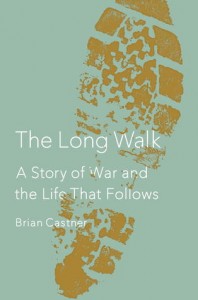 The Long Walk: a Story of War and the Life That Follows by Brian Castner
The Long Walk: a Story of War and the Life That Follows by Brian Castner
When I deployed for the first time [my wife] asked her grandmother for advice. Her grandfather served in Africa and Europe in World War II. Her grandmother would know what to do.
“How do I live with him being gone? How do I help him when he comes home?” my wife asked.
“He won’t come home,” her grandmother answered. “The war will kill him one way or the other. I hope for you that he dies while he is there. Otherwise the war will kill him at home. With you.”
The story of Brian Castner’s Crazy is trim, sad, and a must-read.
What makes this book so different from the other books about the Iraq war?
1. There are no real politics. You can certainly superimpose your own politics on it if you want, as is the case with goddamn EVERYTHING, but the book itself goes a different way. It’s highly personal, focusing on the side of things that you don’t see so much. The writer talks about what he knows and what he experienced, and he leaves the rest alone.
2. He does a good job making you understand his Crazy. A lot of books about people who are crazy try to make you experience crazy for yourself, see the world as they see it. So they use weird line breaks, broken sentences, bizarre wordplay and other tricks to try and take you somewhere you can’t go because, well, you’re not crazy. What Castner does is explain what he is thinking about when he’s feeling crazy. How it changes him.
3. This is not, like so many other books about people with problems, about redemption. Yes, there is a brief moment when he seems to overcome his crazy, just for a second. But it comes back, of course. And the odds against him are insurmountable. After he describes panicking in an airport and mentally planning who to shoot first and where to go in order to escape, it’s hard to imagine that he’ll ever be all the way better. After he explains just a touch of the physics behind explosions and why they can destroy a brain without destroying the body around it, it’s hard to think that he’s ever going to be the way he was before. After he says that his wife wants him to cheat on her just so that she could leave him, you kind of give up on the idea of him having a normal life.
So, in a genre that involves a lot of dates, tactical information, and insider knowledge, someone has written a book that is deeply personal and brave in revealing that something inside someone who made a career out of being tough and mentally calm, that something inside that person has been fundamentally and irrevocably broken. More than that, it does a great job of connecting the past with the present and making a reader understand the problem: there’s really IS no difference.
